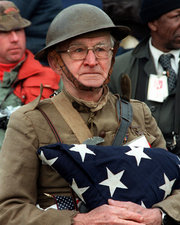 When we were in grade school, they called it Armistice Day, and some of us knew veterans of that First World War, fought in 1914-18. We knew even more vets from the Second World War, which ended in September of 1945, the month we entered kindergarten.
When we were in grade school, they called it Armistice Day, and some of us knew veterans of that First World War, fought in 1914-18. We knew even more vets from the Second World War, which ended in September of 1945, the month we entered kindergarten.In June of 1954, just before we entered SHS, they changed the name to Veterans Day, and so it has been ever since on November 11. It's a day to reflect on the fact that since our lives began in 1940, 149 wars have rocked the world and presently 22 are ongoing.
To mark Veteran's day, SHS has awarded its Hall of Fame honor to Brigadier General Alex W. Talmant, a much-decorated veteran of several wars and retired commander of the 47th Air Division in California. The son of a Lithuanian coal miner, he grew up near the old Pillsbury plant in Springfield. At SHS he visited several history classes and told stories. In a showcase outside the main office is a display honoring 32 SHS graduates now serving in the armed forces.

5 comments:
Will,
Sadly fascinating. Thanks for the look-for!
Lee
We spent Veterans Day in Santa Fe. They had a short parade with veterans for the war, veterans against the war, lots of flags and the Red Hat Ladies. Quite fun. There was a moving display on the plaza that honored by pictures and short bios each American who has died during the Iraq war.
Of course the banks and state government offices were closed on Friday. I am not quite sure what that had to do with the 11th hour of the 11th day of the 11th month that Miss Cheeseboro taught us about the armistice and Armistice Day.
Ann
Armistice Day is the anniversary of the official end of World War I, November 11, 1918. It commemorates the armistice signed between the Allies and Germany at Compiègne, France, for the cessation of hostilities on the Western Front, which took effect at eleven o'clock in the morning — the "eleventh hour of the eleventh day of the eleventh month." While this official date to mark the end of the war reflects the ceasefire on the Western Front, hostilities continued in other regions, especially across the former Russian Empire and in parts of the old Ottoman Empire.
Above is what I found. Wondered the same! WHY?
Lee
Nice comments, Ann and Lee. And I also like Ann's memory of Miss Nina K. Chesebro, one of my favorite teachers at Butler.
I learned from the link below that over 10,000 soldiers died on the last day of WW I, which is more than died on D-Day in WW II. Some generals disregarded the cease-fire order and sent troops out "to punish the Hun."
http://www.pbs.org/newshour/bb/military/july-dec04/veteran_11-11.html
WILL the "wars" ever end?
"Buried Treasure
24 October 2006
Yesterday there were two separate instances in Germany of old munitions being struck by machinery and detonating.
A construction worker was killed in an explosion on the A3 near Aschaffenburg (between Frankfurt and Würzburg). He was scraping concrete about 30 cm deep when he apparently stuck a buried bomb from WWII. Pieces of machinery were thrown up to 500 meters from the site; a number of cars and houses were damaged, but noone was injured. The autobahn was closed for several hours. Stars and Stripes also has report, as US bases are also in the area.
A farmer in Grabow near Dannenberg struck a phosphorus bomb with his plow, dislodging the detonator and releasing a cloud of phosphorus. He immediately called authorities, and they could only watch as the device exploded a short time later. Noone was hurt. It is thought that there are still a number of bombs buried in the area, as an Allied bomber released a full load of bombs before making a emergency landing in Grabow near the end of WWII.
Hundreds, if not thousands, of old bombs are still found every year. Last week over 20000 residents in Hannover were evacuated from their homes to defuse 3 bombs. The NY Times article quotes the owner of a munitions clears firm: “We’ll have enough work to keep us busy for the next 100 to 120 years”.
I’ve said it before, but I’ll say it again. If a rich, developed country is still clearing munitions 60 years after being devestated by war, how long will it take poor countries to recover from war, especially since modern explosives are smaller and harder to find?" Provided by a long time EXPAT American living in Germany.
When I lived in Dresden, it was NOT uncommon for a bomb or two to float to the surface of the Elbe. ALL bridges were closed until the bomb-fellows could come and remove the danger. Here, too, we live with the possibility ALL the time. Where I live in Hamburg, once in Denmark, it was leveled. It is possible that a bomb is under the ground.
Lee
Post a Comment